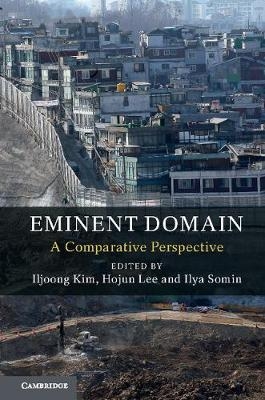
Eminent Domain
Cambridge University Press (Verlag)
978-1-316-62833-1 (ISBN)
The taking of private property for development projects has caused controversy in many nations, where it has often been used to benefit powerful interests at the expense of the general public. This edited collection is the first to use a common framework to analyze the law and economics of eminent domain around the world. The authors show that seemingly disparate nations face a common set of problems in seeking to regulate the condemnation of private property by the state. They include the tendency to forcibly displace the poor and politically weak for the benefit of those with greater influence, disputes over compensation, and resort to condemnation in cases where it destroys more economic value than it creates. With contributions from leading scholars in the fields of property law and economics, the book offers a comparative perspective and considers a wide range of possible solutions to these problems.
Iljoong Kim is Professor of Economics at Sungkyunkwan University, Seoul, where he was also awarded the Dasan Economics Chair. Professor Kim is a leading expert in the field of law and economics in Korea, where his research activities have ignited scholarly interest in the field. Hojun Lee is a Fellow at the Korean Development Institute (KDI). His academic research topics include mechanism design in public sectors, law and economics of property rights, and public finance of regional development. He is also Director of Public Private Partnership Division at KDI. Ilya Somin is Professor of Law at the George Mason University, Virginia. His research focuses on constitutional law and property law. He is the author of The Grasping Hand: Kelo v. City of New London and the Limits of Eminent Domain (2015) and Democracy and Political Ignorance, 2nd edition (2016).
1. Taking law from an economic perspective Hans-Bernd Schäfer; 2. Eminent domain in the United States Ilya Somin; 3. Direct expropriation: the multi-layered legal protection in Europe Anne van Aaken; 4. Eminent domain law in Taiwan: new law, old practice? Yun-chien Chang; 5. Compulsory land acquisition in developing countries: shifting paradigm or entrenched legacy? Jonathan Lindsay, Klaus Deininger and Thea Hilhorst; 6. Public interest criteria and Korea's scrutiny system Hojun Lee; 7. Who exercises the eminent domain power in Korea: with focus on private takings Iljoong Kim; 8. Just compensation in eminent domain in Korea: from the perspective of fairness Byungkoo Cho; 9. Overall due process in takings in Korea Kisang Jung; 10. Distribution of development surplus in takings Sungkyu Park; 11. Takings, disputes, and resolutions in Korea: a quantitative review Duol Kim.
| Erscheinungsdatum | 04.05.2017 |
|---|---|
| Zusatzinfo | Worked examples or Exercises; 18 Tables, black and white; 24 Halftones, black and white; 6 Line drawings, black and white |
| Verlagsort | Cambridge |
| Sprache | englisch |
| Maße | 155 x 232 mm |
| Gewicht | 470 g |
| Themenwelt | Recht / Steuern ► EU / Internationales Recht |
| Recht / Steuern ► Privatrecht / Bürgerliches Recht ► Internationales Privatrecht | |
| Recht / Steuern ► Privatrecht / Bürgerliches Recht ► Sachenrecht | |
| Wirtschaft ► Allgemeines / Lexika | |
| Wirtschaft ► Betriebswirtschaft / Management ► Rechnungswesen / Bilanzen | |
| Betriebswirtschaft / Management ► Spezielle Betriebswirtschaftslehre ► Immobilienwirtschaft | |
| ISBN-10 | 1-316-62833-7 / 1316628337 |
| ISBN-13 | 978-1-316-62833-1 / 9781316628331 |
| Zustand | Neuware |
| Haben Sie eine Frage zum Produkt? |
aus dem Bereich


